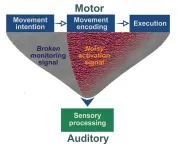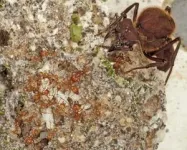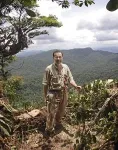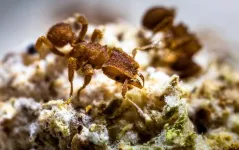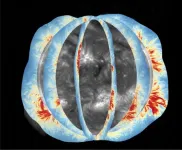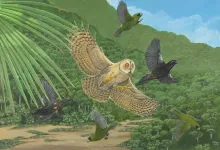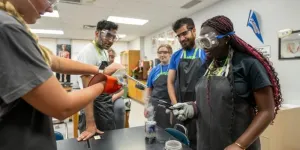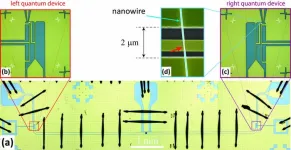What happens in the brain when a person with schizophrenia “hears voices”?
New study used brain scans of people with and without auditory hallucinations to model the brain networks that may be involved
2024-10-03
(Press-News.org) Auditory hallucinations are likely the result of abnormalities in two brain processes: a “broken” corollary discharge that fails to suppress self-generated sounds, and a “noisy” efference copy that makes the brain hear these sounds more intensely than it should. That is the conclusion of a new study published October 3rd in the open-access journal PLOS Biology by Xing Tian, of New York University Shanghai, China, and colleagues.
Patients with certain mental disorders, including schizophrenia, often hear voices in the absence of sound. Patients may fail to distinguish between their own thoughts and external voices, resulting in a reduced ability to recognize thoughts as self-generated. In the new study, researchers carried out electroencephalogram (EEG) experiments measuring the brain waves of twenty patients diagnosed with schizophrenia with auditory hallucinations and twenty patients diagnosed with schizophrenia who had never experienced such hallucinations.
In general, when people are preparing to speak, their brains send a signal known as “corollary discharge” that suppresses the sound of their own voice. However, the new study showed that when patients with auditory hallucinations were preparing to speak a syllable, their brains not only failed to suppress these internal sounds, but had an enhanced “efference copy” response to internal sounds other than the planned syllable.
The authors conclude that impairments in these two processes likely contribute to auditory hallucinations and that targeting them in the future could lead to new treatments for such hallucinations.
The authors add, “People who suffer from auditory hallucinations can ‘hear’ sounds without external stimuli. A new study suggests that impaired functional connections between motor and auditory systems in the brain mediate the loss of ability to distinguish fancy from reality.”
#####
In your coverage, please use this URL to provide access to the freely available paper in PLOS Biology: http://journals.plos.org/plosbiology/article?id=10.1371/journal.pbio.3002836
Citation: Yang F, Zhu H, Cao X, Li H, Fang X, Yu L, et al. (2024) Impaired motor-to-sensory transformation mediates auditory hallucinations. PLoS Biol 22(9): e3002836. https://doi.org/10.1371/journal.pbio.3002836
Author Countries: China
Funding: This study was supported by the National Natural Science Foundation of China 32071099 and 32271101 (https://www.nsfc.gov.cn/), Natural Science Foundation of Shanghai 20ZR1472100 (https://svc.stcsm.sh.gov.cn/), Program of Introducing Talents of Discipline to Universities, Base B16018 to X.T., East China Normal University (ECNU) Academic Innovation Promotion Program for Excellent Doctoral Students YBNLTS2019-026 (http://www.yjsy.ecnu.edu.cn/ ) and China Postdoctoral Foundation under Grant Number 2024M752047 (https://www.chinapostdoctor.org.cn/bshjjh/) to F.Y. The funders had no role in study design, data collection and analysis, decision to publish, or preparation of the manuscript.
END
ELSE PRESS RELEASES FROM THIS DATE:
2024-10-03
When humans began farming crops thousands of years ago, agriculture had already been around for millions of years. In fact, several animal lineages have been growing their own food since long before humans evolved as a species.
According to a new study, colonies of ants began farming fungi when an asteroid struck Earth 66 million years ago. This impact caused a global mass extinction but also created ideal conditions for fungi to thrive. Innovative ants began cultivating the fungi, creating an evolutionary partnership that became even more tightly intertwined 27 million years ago and continues to this day.
In a paper published today, Oct. 3, in the journal Science, scientists at the Smithsonian’s ...
2024-10-03
EMBARGOED: Not for Release Until 2:00 pm U.S. Eastern Time Thursday, 3 October 2024.
A new era of solar observation
International team produces global maps of coronal magnetic field
Contacts:
Audrey Merket, NSF NCAR and UCAR Science Writer and Public Information Officer
amerket@ucar.edu
303-497-8293
David Hosansky, NSF NCAR and UCAR Manager of Media Relations
hosansky@ucar.edu
720-470-2073
For the first time, scientists have taken near-daily measurements of the Sun’s global coronal magnetic field, a region of the Sun that has only been observed irregularly in the past. The resulting observations ...
2024-10-03
The extinction of hundreds of bird species caused by humans over the last 130,000 years has has led to substantial reductions in avian functional diversity – a measure of the range of different roles and functions that birds undertake within the environment –
and resulted in the loss of approximately 3 billion years of unique evolutionary history, according to a new study published today in Science.
Whilst humans have been driving a global erosion of species richness for millennia, the consequences of past extinctions for other dimensions of biodiversity are poorly known. ...
2024-10-03
Researchers from DZNE and Otto von Guericke University Magdeburg have identified individuals with increased risk for dementia using mobility data, recorded during a smartphone-based wayfinding task on the university campus. The findings, reported in the journal PLOS Digital Health, show the potential of smartphone data, collected in conditions close to everyday life, for the early detection and monitoring of Alzheimer’s disease. The study included 72 adults; about a third of them with subjective cognitive decline (SCD), a condition that is a known risk factor for dementia.
Alzheimer’s disease usually develops unnoticed over years and eventually ...
2024-10-03
Government subsidies for business practices and processes should be approached with caution, even when they seem to be environmentally friendly, writes a group of scientists and economists in this week’s Policy Forum in the journal Science.
They argue that subsidies can alter market pressures, leading to unintended consequences that not only perpetuate harmful subsidies over time but also diminish the overall effectiveness of those intended to promote environmental sustainability.
Therefore, when they must be used, subsidies should have clear end-dates, advise the authors.
“We’ve got this odd juxtaposition of ...
2024-10-03
Neuroscientists had a problem.
For decades, researchers had a theory about how an animal’s brain keeps track of where it is relative to its surroundings without outside cues – like how we know where we are, even with our eyes closed.
According to the theory, which was based on brain recordings from rodents, networks of neurons called ring attractor networks maintain an internal compass that keeps track of where you are in the world. An accurate internal compass was thought to require a large network with many neurons, while a small network with few neurons would cause the compass’s needle to drift, creating errors.
Then researchers discovered an internal compass ...
2024-10-03
University of Texas at Arlington UTeach Master Teacher Karen Jo Matsler will be awarded the 2025 Melba Newell Phillips Medal in January from the American Association of Physics Teachers (AAPT) in recognition of her extensive contributions to physics education and her tireless efforts to support educators nationwide. Founded in 1930, AAPT is a national organization dedicated to advancing the teaching and understanding of physics.
For more than 20 years, Dr. Matsler has been a tireless advocate of physics education, working with state legislators and educational agencies ...
2024-10-03
About The Study: The modified vaccinia Ankara–Bavarian Nordic (MVA-BN) vaccination generated mpox antibodies that waned by 6 to 12 months. In participants who received 2 doses of MVA-BN vaccine, mpox antibody responses at 12 months were comparable to or lower than peak antibody responses in people receiving 1 dose, which provided limited protection.
Quote from corresponding author Dan H. Barouch, MD, PhD:
“In this observational study, we show that mpox antibody responses decline 6-12 months following Jynneos (MVA-BN) vaccination. Our data suggest that protective immunity may ...
2024-10-03
A new study led by researchers at Johns Hopkins Bloomberg School of Public Health estimates that thousands of lives could have been saved during the first year of the COVID-19 pandemic if convalescent plasma had been used more broadly, particularly in outpatients at high risk for severe disease and in hospitalized patients during their first few days of admission.
Convalescent plasma from patients who had recovered from COVID was used starting in the early months of the pandemic at the urging of a group of physicians who cited the blood ...
2024-10-03
Quantum communication and quantum computing operate based on quantum bits (qubits) as the smallest unit of information — related to bits in a classical computer. Of the many different approaches currently being investigated around the world, one promising option is to use Andreev pair qubits.
These qubits are formed at interfaces between a metal and a superconductor in a process known as Andreev reflection. Here, an electron from the metal enters the superconductor, where it becomes part of an electron pair (a Cooper pair) — while a hole, ...
LAST 30 PRESS RELEASES:
[Press-News.org] What happens in the brain when a person with schizophrenia “hears voices”?
New study used brain scans of people with and without auditory hallucinations to model the brain networks that may be involved
